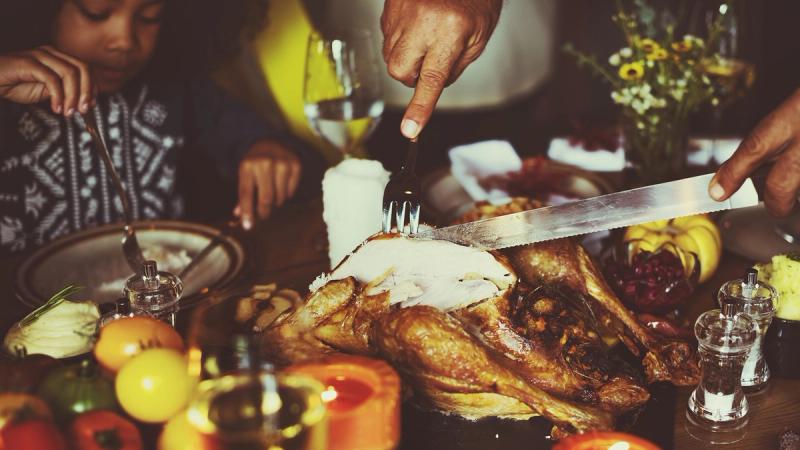The holiday rush from Halloween to Thanksgiving and Christmas to New Year’s is on. Holiday retail spending this year is projected to surpass an astounding $1 trillion from November to January. It’s a time of year that evokes a range of emotions; from great excitement and joy, to the glib sentimentality of holiday cheer, to increased anxiety and stress. Adding COVID-19 uncertainties into the mix, and the 2020 holiday season will be a challenge to navigate.
This isn’t another one of those essays about “Five Things to be Thankful For,” or “The Commercialization of Christmas.” Rather, it explores how recovering the mundane virtues of gratitude and humility can be a steadying anchor amidst the blur. These complementary virtues are often overlooked in an age of entitlement and ambition that celebrates autonomy and pride. Yet, an orientation towards the world grounded in gratitude and humility offers a more sustainable path through the holiday labyrinth—and everyday life for that matter.
An Orientation of Gratitude
When we hear the word gratitude, perhaps what comes to mind is something like the obligatory thank-yous and acknowledgements rattled off in the typical awards speech—“I’d like to thank the producers, my friends and family, and of course God.” We’ve heard those speeches before—probably one too many times. Such a recognition of others may be a place to start. Yet, there is a more robust approach to gratitude found in understanding all of life as gift.
In Not as the World Gives, Stratford Caldecott explains how, “The idea of gift, seemingly so mundane, has an extraordinary depth….Giving is what we are made for.” Approaching life as gift “re-establishes the priority of relationship over object, or person over thing” (2). This is a refreshing alternative to the regnant mindset of choice, entitlement, and rights. Caldecott states that the model of humanity “that we inherit from the Enlightenment was based on man understood as an individual rather than a ‘person’ in the relational sense. It turns man into a solitary and conflictual actor in the market, an isolated and docile subject of the state, pursuing his own survival, pleasure, and power” (189).
There’s not much room for gratitude when the forces of culture press us towards self-fulfillment or utopian dreams. Being thankful doesn’t make much sense when rights are viewed as entitlements. Giving of yourself to others is downright foolish if humans are just self-interested, autonomous, atomistic agents. As R.J. Snell notes, “Our culture’s deep ingratitude is the long, nihilistic outworking of the logic of modern thought itself. When human experience is reduced to only will and power struggle, there is no room for gratefulness.”
Caldecott reminds us that there is a better way found in the Church’s teaching that “recognizes man as originally ‘in-relation,’ an ‘I-in-relation,’ whose needs and therefore self-interest involve social goods founded on gift, and specifically on self-gift and self-reception….Man is a relational creature, whose being is received rather than self-made” (189).
This situates humanity in relational frameworks for flourishing: roles and responsibilities towards God, towards one another, and towards creation. Giving and receiving pulses and circulates as the lifeblood through these relations, and leads us to treasure one another and the ultimate Giver who gives the gift of Himself. This is no contractual deal struck up between people, or man and God. It is all gift. Snell continues, “Those of us who have not renounced cosmic order and the providence that brings that order to fulfillment, by contrast, know that all things willed or permitted by God work for good. Thus we should be grateful—profoundly grateful—for everything.”
From a secular perspective, Matthew Crawford offers a helpful take on gratitude as well. The insights are found in Crawford’s recent inquiry into human driving—perhaps an unlikely place to find such things. In Why We Drive, Crawford explores driving as a “domain of skill, freedom, and individual responsibility” (7). In the midst of his thought-provoking defense of driving, he offers an outlook that can foster habits of gratitude.
“Affection for the present” is how Crawford puts it, echoing Michael Oakeshott. Crawford explains that this is not a “hankering after the past nor fear of the future,” but a cherishing of “what actually exists, because one sees the value in it” (82). Affection for the present brings us to treasure each moment, fulfilling our vocations towards one another, by focusing not on constructing some better self or abstract future, but by engaging the very people that are right around us.
Crawford also establishes another helpful concept throughout the book: “being fully awake” (34). He develops the importance of the idea for driving of course, but also for society more broadly. When human beings are with each other, we can give the gift of our full and undistracted presence, which itself is an act of gratitude towards the other, and in turn can be received with gratitude.
Being fully awake also requires staying engaged in the physical world around us, which is a healthy expression of embodied human agency. As Crawford put it in his notable Shopclass as Soulcraft, “The satisfactions of manifesting oneself concretely in the world through manual competence have been known to make a man quiet and easy. They seem to relieve him of the felt need to offer chattering interpretations of himself to vindicate his worth” (15). For Crawford, being fully awake means living life not as one who is acted upon by outside forces, but as one who is acting, living, and doing in the realm of the real, physical world.
Practicing affection for the present and being fully awake in each moment habituate gratitude into our lives, helping us to treasure all of life as gift. Life as gift reminds us that we are created beings who receive everything from the hand of our gracious God. Acknowledging our position as creatures in this way fosters the parallel virtue of humility.
An Orientation of Humility
Gratitude and humility are like hand in glove, as habits of gratitude correlate strongly to expressions of humility. When we hear the word humility perhaps we think of someone who is self-effacing. C.S. Lewis, in Mere Christianity, suggests something more. A humble person “will not be a sort of greasy, smarmy person, who is always telling you that, of course, he is nobody. Probably all you will think about him is that he seemed a cheerful, intelligent chap who took a real interest in what you said to him” (112). Taking a real interest in what someone says, as Lewis describes, resonates nicely with Crawford’s advice to be “fully present.”
Lewis continues his description of the humble person, “If you do dislike him it will be because you feel a little envious of anyone who seems to enjoy life so easily. He will not be thinking about humility: he will not be thinking about himself at all” (112). Here we find the principle of “affection for the present” at work in those who enjoy life so easily, that they forget about themselves.
The vice that runs counter to the virtue of humility is pride. Lewis tackles this too. “We must not think Pride is something God forbids because He is offended at it, or that Humility is something He demands as due to His own dignity—as if God himself was proud. He is not in the least worried about his dignity. The point is, He wants you to know him: wants to give you Himself” (111). This echoes Caldecott’s “life as gift.” God gives us the gift of Himself, and it is there that we find our place as an “I-in-relation,” both towards God and one another.
There is a communion of sorts that develops as a gift flows from the giver to the receiver. Here in this communion we find expressions of both humility and gratitude. It is, after all, more than a coincidence that God’s sacramental gift of Himself is not only understood as communion, but also Eucharist, that is, thanksgiving (gratitude).
In the secular realm, Jordan Peterson’s penetrating vision into the human psyche uncovers a different aspect of humility. Peterson has spent much of his academic career struggling with the rise of 20th century totalitarianism—a humbling field of study to say the least. He has consistently approached this study with the stark realization that it just as easily could have been him participating in the control and persecution of groups deemed undesirable at the time.
This sobering perspective is rooted in humility; the reality of one’s own limitations, weaknesses and corruption, and the complexities of human existence—what Peterson calls in his Foreword to the 50th anniversary edition of Solzhenitsyn’s Gulag Archipelago, “our thrownness, our arbitrary placement in the flow of time” (xvii). While we as Christians may quibble with the degree to which this is an arbitrary placement, we can appreciate the sense in which much of life in a fallen world seems random, unfair and broken. As Peterson puts it, “we all accrue undeserved and somewhat random privilege from the vagaries of our place of birth, our inequitably distributed talents, our ethnicity, race, culture, and sex” (xvii). Such a complicated existence defies easy categorization and is an antidote to pride and a support to humility.
Peterson looks to Solzhenitsyn, “who so profoundly insists, that the line dividing good and evil cuts through the heart of every human being” (xvii). Instead of reaching for utopian dreams like the bloody revolutions of the 20th century, Peterson suggests taking “full stock and full measure of ineradicable human imperfection” and setting “modest goals.” He continues, “That’s humility. That’s clear-headed knowledge of the limitations of human machination and good intention” (xviii).
Humility is both recognizing our creaturely limits and treasuring all of life as gift. Life on this side of Eden reveals the depths of original sin which seats us all around the same table, susceptible to our own self-deceptions and also to real evil. We are not any better than the so-called evil-doers, as Solzhenitsyn discovered, from behind GULAG barbed-wire. “A human being hesitates and bobs back and forth between good and evil all his life. He slips, falls back, clambers up, repents, things begin to darken again….But the possibility of returning remains, and he himself is still within reach of our hope” (175). Yet even in such a fallen world, or perhaps especially in such a world, within these humbling creaturely limits, we find a God who has shared in our suffering. We find too, in the shared experience of human struggle and brokenness that we are drawn outside of ourselves to share in the suffering of others.
Conclusion
The more I reflect on gratitude and humility, the more they seem inseparable. Gratitude and humility function in tandem, mutually building upon each other in a reinforcing loop that strengthens each time these virtues are exercised and expressed. Practices of gratitude and humility such as exhibiting affection for the present, being fully awake, embracing life as gift and acknowledging our creaturely limits, form a liturgy of sorts to help rightly order our lives. As the holiday scramble unfolds, the clarifying possibilities of humility and gratitude offer a way forward. This is a path not gilded with the sentimental tinsel-trappings of victorious living. It is a path less-trodden, spotted with struggling pilgrims, who are deeply humbled by the messy realities of life in a fallen world, yet profoundly grateful for it all and for the One who provides final deliverance as complete gift.
Joshua Pauling teaches high school history, was educated at Messiah College, Reformed Theological Seminary, and Winthrop University. In addition to Modern Reformation, Josh has written for Front Porch Republic, Mere Orthodoxy, Public Discourse, Salvo Magazine, and The Imaginative Conservative. He is also head elder at All Saints Lutheran Church (LCMS) in Charlotte, North Carolina.



